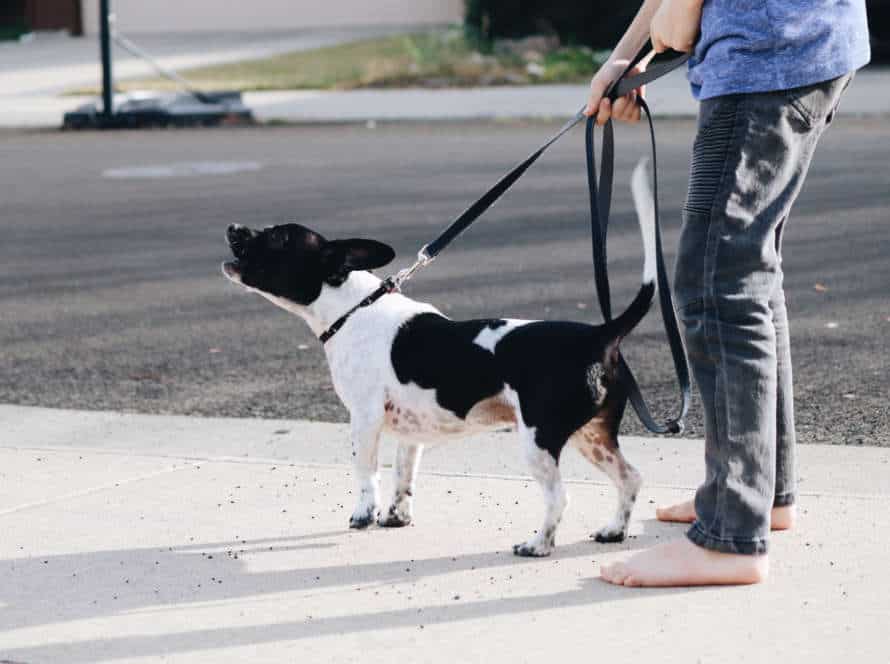When to Be Concerned About Your Puppy’s Barking
Your pup’s occasional bark is okay, but if it’s too much, that could be trouble. Here are a few signs to watch out for:
- Barking often at strangers or new folks.
- Barking non-stop when you’re not there.
- Barking at night or in the wee hours.
- Barking at other dogs or animals.
If your pup is barking too much, it’s time to teach them how to control it. You can use positive reinforcement, or get help from a professional. Remember, barking is natural, but too much can be caused by fear or stress, which should be addressed with love and patience.
Pro tip: Make sure your pup gets enough exercise and stimulation, to help stop their extra barking.
Normal Puppy Barking
Puppy barking can be excessive, especially if it’s all day long. Don’t panic though, because it’s often quite normal. Barking is just puppies communicating and letting us know what they need. It’s essential to distinguish which type of barking is normal and which could be a problem.
Why puppies bark
Pups bark as a form of communication and to express their needs and emotions. Different reasons why puppies bark include: greeting, seeking attention, being bored, playing, being scared, and warning.
Puppy barking can be addressed with puppy training classes, socialization and learning their different barks. Excessive, persistent barking may be a sign of anxiety, aggression or an illness. Get help from an animal behaviorist or vet to check your pup.
As a pet owner, it’s important to monitor your puppy’s barking. Make sure it’s not a nuisance to you, your neighbors or other animals.
Pro Tip: Discourage excessive barking by giving your pup a toy, activity or reward for good behavior.
Types of normal puppy barking
Puppies have a playful nature and bark to communicate with us and other dogs. Not all puppy barks are bad, so it helps to know the types of normal puppy barking.
- Attention-seeking barks: Puppies bark to get attention from their owners, like when they want to play or go out.
- Play barks: When puppies play, they bark to talk to other dogs or their owners.
- Warning barks: They bark to tell their owners about unusual sounds or dangerous situations.
- Excitement barks: Puppies bark with joy when they get food or you come home.
Knowing these normal puppy barks can help you decide when to be worried or when to train them to stop too much barking.
When it is acceptable
Puppy barking is part of their nature. But, there are times when it’s not appropriate.
Acceptable barking might be to alert you to danger, during play, or when they’re greeting you.
However, excessive barking, barking at people, barking at other dogs, or due to separation anxiety is unacceptable.
If your puppy’s barking is too much, it could be a sign of a deeper problem. Get help from a professional dog trainer or vet to figure out the cause.
When to Be Concerned
Puppy barking is normal. Reasons can be boredom, attention, excitement or fear. But, if pup bark too much, something could be wrong. This article talks about when you should worry about pup barking and when to get help.
Excessive barking
Dogs and puppies naturally bark, but too much barking can be a worry. Here are some signs to look out for if your pup’s barking is becoming a problem:
- Barking that continues for a long time, even when there’s no obvious reason.
- Reacting to tiny things with lots of barking.
- Barking plus aggressive actions like snarling, snapping or biting.
- Making noise that disturbs daily activities or sleep.
- Barking that causes your neighbors or community to complain.
If you spot any of these signs, it may be time to talk to a vet or dog trainer. Excessive barking is usually caused by anxiety, fear or aggression.
How to know if your puppy is barking excessively
Puppies bark – it’s natural. But, if your pup is barking too much – there may be a problem. Here are some signs to look out for:
- Duration: 5+ minutes of non-stop barking? That’s a warning sign!
- Frequency: 20+ barks in a minute? Could be excessive.
- Time of day: Barking during rest periods or late at night? There may be an issue.
- Context: Barking in response to sights or sounds? Anxiety or fear may be present.
- Body language: Watch your pup’s body language. Pacing or shaking? Some attention may be needed.
If you spot any of these signs, it’s time to take action.
Possible reasons for excessive barking
Does your pup bark too much? It could have various causes. But, there are times when you should be worried. Here are some of them:
- Boredom or loneliness
- Fear or anxiety
- Territorial behavior
- Attention-seeking
- Medical conditions
If your pup barks without any reason and seems to be in distress, consult a vet or animal behaviorist. If barking is associated with aggression or sudden changes, it’s best to look for professional help. This will help tackle any issues early. It’ll reduce the pup’s stress and make sure it lives a healthy life.
Pro Tip: Training and socialization can also reduce excessive barking.
Tips for Managing Excessive Barking
It’s tricky know when to worry about your pup’s barking. Get a grip on it early – don’t let it escalate when they get older. Here are some top tips to help control too much barking from your pup:
- Start training your pup early on to respond to basic commands such as “sit” and “stay”.
- Avoid giving your pup attention when they bark unnecessarily. Instead, reward them with a treat or positive reinforcement when they bark at appropriate times, such as when alerting you to something.
- Identify the triggers that cause your pup to bark excessively and work to desensitize them to those triggers through gradual exposure and positive reinforcement.
- Provide plenty of exercise and mental stimulation for your pup to reduce their boredom and anxiety, which can lead to excessive barking.
- Consider seeking professional help from a trainer or behaviorist if your pup’s excessive barking persists despite your efforts to address it.
Positive reinforcement training
Positive reinforcement training is great for managing excessive puppy barking. It’s often better than punishing or aversive techniques. Here are tips to reduce barking:
- Teach the “quiet” command by rewarding with a treat/toy when they stop barking on cue.
- Redirect attention to a toy/treat when they bark excessively. Reward them for being quiet.
- Don’t give attention/treats when they bark to demand something – this reinforces it.
- Be consistent and patient with training. Don’t punish barking – this may worsen the behavior.
- If barking persists despite positive reinforcement, it could be an underlying issue. Consult your vet/professional trainer.
Pro tip: Practice positive reinforcement consistently and avoid negative reinforcement for successful bark management.
Finding the root cause
Puppies tend to bark a lot, so it’s essential to find out why. Here are tips to help manage their barking:
- Identify the trigger – Puppies may bark due to boredom, fear, or to get attention. Knowing why is key.
- Ignore attention-seeking barking – If they bark to get your attention, ignore them – this could break the habit.
- Be consistent – Reward them for good behaviour, and discourage excessive barking.
- Provide exercise – Ensure they’re active throughout the day – this will help reduce anxiety and barking.
- Seek expert help – If training doesn’t work, get help from a vet or dog trainer.
Patience, consistency, and a positive attitude are essential for managing puppy barking.
Resolving separation anxiety
Separation anxiety is an issue many dogs face. It can lead to excessive barking, destructive behavior and emotional distress. Here are some tips to help your pup:
- Practice arrivals and departures regularly to desensitize your pup to when you leave and come back.
- Create a cozy and safe space for them while you’re gone. Put in their favorite toys, blankets and treats.
- Set a schedule for feeding, walks and playtime.
- Try calming products like pheromone diffusers, natural supplements or prescription medication.
- If their anxiety persists, consult a professional dog trainer or behaviorist.
- Remember: Resolving separation anxiety requires patience and consistency from owners. Show love, comfort, and proper training – it can do wonders in reducing their stress and anxiety.
Seeking Professional Help
Do you feel your pup’s barking is too much or wrong? Maybe it’s time for professional help! It’s normal for puppies to bark, yet some bark too much, in an aggressive way, at bad times, or out of anxiousness. Figure out the cause and get a pro to help.
When to consult a veterinarian
Puppies bark to communicate with the world. But, if excessive barking is noticed, it’s time to see a vet. Here are signs you need help:
- Barking more than usual, especially at strange hours.
- Growling or biting when barking.
- Chewing or digging in addition to barking – this might be separation anxiety.
- Signs of illness or injury, such as limping, laziness or not eating.
Early detection is key to a pet’s happiness and health – when in doubt, consult a vet!
Professional dog training
Barking is natural for dogs. But, if it’s too much, it could be a sign of something wrong. Here are signs to watch out for:
- Excessive barking, even when there’s no stimulus.
- Aggressive barking.
- Destructive chewing.
- Biting, growling or snapping.
- Avoiding social interaction.
If you see these signs, it’s time to get professional help. They can teach your pup to control its barking. As well as other behavior problems like leash pulling, potty training, and obedience. It’s important to get help ASAP.
Pro tip – Positive reinforcement is a great training method. By rewarding good behaviour, it will become a habit.
Medication for anxiety and stress-related barking.
If your pup’s barking is from anxiety or stress, meds may help calm them.
Before using meds, find out why they bark and address any issues that may be causing their anxiety or stress.
If the behavior continues, chat with a vet or a pro dog trainer to decide the best approach.
They could suggest meds like anti-anxiety drugs or antidepressants to manage your pup’s behavior. But meds should only be used with behavior modification training and should only be prescribed by a licensed vet.
Frequently Asked Questions
1. Why is my puppy barking excessively?
Excessive barking can be a sign of anxiety, fear, boredom, or even as a way to get attention. It’s important to observe your puppy’s behavior and environment to determine the cause of the barking and address it accordingly.
2. When should I be concerned about my puppy’s barking?
If the barking becomes incessant or aggressive, it’s time to be concerned. Also, if your puppy is barking excessively for extended periods of time, it could be a sign of an underlying medical issue or behavioral problem.
3. Can I train my puppy to stop barking?
Yes, with proper training and consistency, you can teach your puppy to bark less or stop barking altogether. Positive reinforcement training methods are often the most effective.
4. Should I ignore my puppy’s barking?
Ignoring your puppy’s barking is not always the best approach. In some cases, it may reinforce the behavior. Instead, try redirecting your puppy’s attention or providing alternative activities to help reduce the barking.
5. Can a professional trainer help with my puppy’s barking?
A professional trainer or behaviorist can help determine the underlying cause of your puppy’s barking and create a personalized training plan to address the behavior. They can also provide guidance and support throughout the training process.
6. When is it appropriate for my puppy to bark?
There are certain situations where it’s appropriate for your puppy to bark, such as when they’re alerting you to danger or signaling that they need to go outside. However, excessive or uncontrolled barking should always be addressed.







